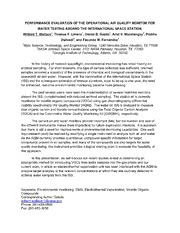
NASA Technical Reports Server (NTRS) 20140003793: Performance Evaluation of the Operational Air Quality Monitor for Water Testing Aboard the International Space Station PDF
Preview NASA Technical Reports Server (NTRS) 20140003793: Performance Evaluation of the Operational Air Quality Monitor for Water Testing Aboard the International Space Station
PERFORMANCE EVALUATION OF THE OPERATIONAL AIR QUALITY MONITOR FOR WATER TESTING ABOARD THE INTERNATIONAL SPACE STATION. William T. Wallace1, Thomas F. Limero1, Daniel B. Gazda1, Ariel V. Macatangay2, Prabha Dwivedi3, and Facundo M. Fernández3 1Wyle Science, Technology, and Engineering Group, 1290 Hercules Drive, Houston, TX 77058 2NASA Johnson Space Center, 2101 NASA Parkway, Houston, TX 77058 3Georgia Institute of Technology, Atlanta, GA 30332 In the history of manned spaceflight, environmental monitoring has relied heavily on archival sampling. For short missions, this type of sample collection was sufficient; returned samples provided a snapshot of the presence of chemical and biological contaminants in the spacecraft air and water. However, with the construction of the International Space Station (ISS) and the subsequent extension of mission durations, soon to be up to one year, the need for enhanced, real-time environmental monitoring became more pressing. The past several years have seen the implementation of several real-time monitors aboard the ISS, complemented with reduced archival sampling. The station air is currently monitored for volatile organic compounds (VOCs) using gas chromatography-differential mobility spectrometry (Air Quality Monitor [AQM]). The water on ISS is analyzed to measure total organic carbon and biocide concentrations using the Total Organic Carbon Analyzer (TOCA) and the Colorimetric Water Quality Monitoring Kit (CWQMK), respectively. The current air and water monitors provide important data, but the number and size of the different instruments makes them impractical for future exploration missions. It is apparent that there is still a need for improvements in environmental monitoring capabilities. One such improvement could be realized by modifying a single instrument to analyze both air and water. As the AQM currently provides quantitative, compound-specific information for target compounds present in air samples, and many of the compounds are also targets for water quality monitoring, this instrument provides a logical starting point to evaluate the feasibility of this approach. In this presentation, we will discuss our recent studies aimed at determining an appropriate method for introducing VOCs from water samples into the gas phase and our current work, in which an electro-thermal vaporization unit has been interfaced with the AQM to analyze target analytes at the relevant concentrations at which they are routinely detected in archival water samples from the ISS. Keywords: Environmental monitoring, DMS, Electrothermal Vaporization, Volatile Organic Compounds Corresponding Author Details: [email protected] Phone: 281-483-2846 Fax: 281-483-3058
